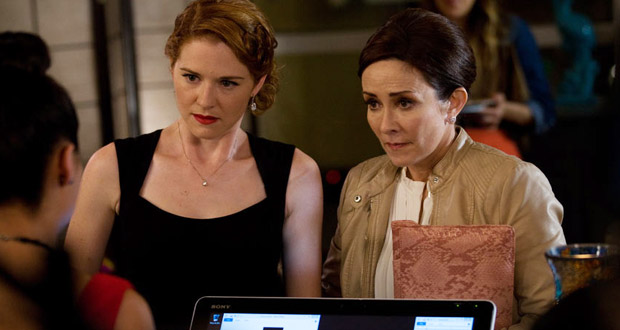‘Mom’s Night Out’ critics spark motherhood debate

Filmmaker Andrew Erwin expects tough and even highly critical movie reviews, but what he read after “Mom’s Night Out” was released shocked even him.
The director and editor of the PG-rated faith-based comedy, Erwin read review after review that blasted not the acting, the script or even the cinematography, but instead the film’s worldview, which spotlighted a stressed-out stay-at-home mom who wants a night out with friends.
Christy Lemire of RogerEbert.com called it “regressive and borderline dangerous” and said it “peddles archaic notions of gender roles.” Inkoo Kang of TheWrap.com labeled it “unabashedly anti-feminist” and said the main character’s “lack of a profession consigns the character into Eisenhower-esque irrelevance.” Ann Hornaday of The Washington Post said the “controlling image of domestic life” in the movie is that “women are doing it wrong” and they better not ask “their spouses to be equal partners.”
Critics, Erwin believed, were criticizing not only the movie but a large segment of the population. Nearly one out of three U.S. mothers – 29 percent according to an April Pew Research Center analysis of government data – don’t work outside the home.
“I didn’t expect the venom and energy behind this,” Erwin said. “As filmmakers, we pretty much sign up to have our work critiqued – to see it criticized or praised. That’s their choice. But I think a lot of the critics – the vast majority of them – stepped beyond critiquing the movie and started debating that the lifestyle portrayal on the screen is not relevant. It feels a little hypocritical. To preach tolerance and anti-bullying and to say we need to be accepting of other people, and then to attack a valid lifestyle is the definition of intolerance. That was shocking, and I think needs to be talked about.”
Erwin and his filmmaker brother, Jon, took heart that filmgoers liked it. Exit polls showed that 82 percent of filmgoers said they’d recommend it to friends. (The average among all films: 60 percent). In some settings, movie fans applauded the film at the end. But an average of only 14 percent of critics liked it, according to RottenTomatoes.com.
“We don’t make movies for the critics,” Erwin said. “We make them for the people. We’re proud to make a movie where the stay-at-home mom wasn’t the butt of the jokes but was the hero of the story. But in no way is it a movie preaching that women have to stay at home.”
The movie, in fact, features a diverse group of female characters. Although the lead character (Allyson, played by Sarah Drew) is a stay-at-home mom, one of the major characters is a single mom (Bridget, Abbie Cobb) juggling jobs while another is a married preacher’s wife (Sondra, Patricia Heaton) with multiple church responsibilities. The movie does not address the work situation of a fourth main female character (Izzy, Andrea Logan White).
“It was a diverse look at motherhood,” Erwin said. “… Modern feminism says it’s the woman’s right to choose whether she wants a career outside of the home or to be a homemaker – and to choose what is best for her family.”
Here, though, feminists are blasting the film.
“It’s upside down when some of the same critics said Mom’s Night Out was dangerous and then turn around and applaud movies that have very violent sexuality in them toward women – that I think is the definition of sexism,” he said.
The point of the film, Erwin said, was to “celebrate moms in all their beautiful forms,” with the hero of the movie being a stay-at-home mom.
“That rarely happens,” he said. “But because of that I think it really threatens some people, and they jump straight from debating the movie to debating the validity of putting that lifestyle on the screen. It was a feel-good family comedy that was designed to affirm moms and represent Christians in a positive light. But to read the different critics – it’s potentially dangerous to society, totally regressive, Eisenhower-esque – I think is an insult to a large segment of the population, to stay-at-home moms.”
— by Michael Foust




